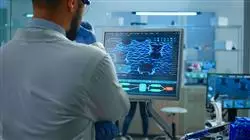University certificate
The world's largest faculty of information technology”
Introduction to the Program
Specializing in Bioinformatics and Big Data in a 100% online way and in only 6 months is now possible thanks to this exhaustive and intensive program that TECH puts at your disposal"

Advances in the field of bioinformatics have benefited many sectors, including medicine. Thanks to the development of increasingly specific and concrete techniques, it has been possible to expand the applications of E-Health in today's environment, optimizing tasks and favoring the processing and massive analysis of biological data. Among the most common strategies is the use of Big Data for data processing through structural genomics, which has made it possible, among other things, to discover new biomarkers and therapeutic targets.
As this is such a broad and complex field, it requires extensive knowledge to dedicate oneself to it. For this reason, and in view of the growing demand for IT professionals specialized in this sector, TECH and its team of experts have decided to create a 100% online program that allows any graduate to specialize in this area. This is an academic experience with which they can delve into the latest developments in computing, as well as the creation and management of biomedical databases from scratch. Additionally, it also places special emphasis on data processing through the most sophisticated tools and software.
In addition to the syllabus and case studies, they will be provided with 450 hours of diverse material: detailed videos, research articles, supplementary readings, research articles, self-awareness exercises and dynamic summaries. In conclusion, everything they need to obtain from this academic experience, the broadest and most comprehensive knowledge to adapt their professional profile to the specifications of the sector and the current labor demand.
With this Postgraduate diploma course you will be able to master the management of the multiple databases that exist today"
This Postgraduate diploma in Bioinformatics and Big Data in Medicine contains the most complete and up-to-date educational program on the market. The most important features include:
- The development of practical cases presented by experts in bioinformatics and databases
- The graphic, schematic, and practical contents with which they are created, provide practical information on the disciplines that are essential for professional practice
- Practical exercises where self-assessment can be used to improve learning
- Its special emphasis on innovative methodologies
- Theoretical lessons, questions to the expert, debate forums on controversial topics, and individual reflection assignments
- Content that is accessible from any fixed or portable device with an Internet connection
You will be able to implement to your skills catalog the extensive and specialized handling of the most innovative techniques for bioinformatics computation"
The program’s teaching staff includes professionals from the sector who contribute their work experience to this educational program, as well as renowned specialists from leading societies and prestigious universities.
Its multimedia content, developed with the latest educational technology, will allow the professional a situated and contextual learning, that is, a simulated environment that will provide an immersive training programmed to train in real situations.
The design of this program focuses on Problem-Based Learning, in which the professional will have to try to solve the different professional practice situations that will arise throughout the academic course. For this purpose, the student will be assisted by an innovative interactive video system created by renowned experts.
You will be able to access the Virtual Campus from any device with Internet connection, whether it is a PC, tablet or cell phone "

A unique academic opportunity to implement the most innovative and effective enrichment and clustering techniques in your practice.
Why study at TECH?
TECH is the world’s largest online university. With an impressive catalog of more than 14,000 university programs available in 11 languages, it is positioned as a leader in employability, with a 99% job placement rate. In addition, it relies on an enormous faculty of more than 6,000 professors of the highest international renown.

Study at the world's largest online university and guarantee your professional success. The future starts at TECH”
The world’s best online university according to FORBES
The prestigious Forbes magazine, specialized in business and finance, has highlighted TECH as “the world's best online university” This is what they have recently stated in an article in their digital edition in which they echo the success story of this institution, “thanks to the academic offer it provides, the selection of its teaching staff, and an innovative learning method aimed at educating the professionals of the future”
A revolutionary study method, a cutting-edge faculty and a practical focus: the key to TECH's success.
The most complete study plans on the university scene
TECH offers the most complete study plans on the university scene, with syllabuses that cover fundamental concepts and, at the same time, the main scientific advances in their specific scientific areas. In addition, these programs are continuously being updated to guarantee students the academic vanguard and the most in-demand professional skills. In this way, the university's qualifications provide its graduates with a significant advantage to propel their careers to success.
TECH offers the most comprehensive and intensive study plans on the current university scene.
A world-class teaching staff
TECH's teaching staff is made up of more than 6,000 professors with the highest international recognition. Professors, researchers and top executives of multinational companies, including Isaiah Covington, performance coach of the Boston Celtics; Magda Romanska, principal investigator at Harvard MetaLAB; Ignacio Wistumba, chairman of the department of translational molecular pathology at MD Anderson Cancer Center; and D.W. Pine, creative director of TIME magazine, among others.
Internationally renowned experts, specialized in different branches of Health, Technology, Communication and Business, form part of the TECH faculty.
A unique learning method
TECH is the first university to use Relearning in all its programs. It is the best online learning methodology, accredited with international teaching quality certifications, provided by prestigious educational agencies. In addition, this disruptive educational model is complemented with the “Case Method”, thereby setting up a unique online teaching strategy. Innovative teaching resources are also implemented, including detailed videos, infographics and interactive summaries.
TECH combines Relearning and the Case Method in all its university programs to guarantee excellent theoretical and practical learning, studying whenever and wherever you want.
The world's largest online university
TECH is the world’s largest online university. We are the largest educational institution, with the best and widest online educational catalog, one hundred percent online and covering the vast majority of areas of knowledge. We offer a large selection of our own degrees and accredited online undergraduate and postgraduate degrees. In total, more than 14,000 university degrees, in eleven different languages, make us the largest educational largest in the world.
TECH has the world's most extensive catalog of academic and official programs, available in more than 11 languages.
Google Premier Partner
The American technology giant has awarded TECH the Google Google Premier Partner badge. This award, which is only available to 3% of the world's companies, highlights the efficient, flexible and tailored experience that this university provides to students. The recognition as a Google Premier Partner not only accredits the maximum rigor, performance and investment in TECH's digital infrastructures, but also places this university as one of the world's leading technology companies.
Google has positioned TECH in the top 3% of the world's most important technology companies by awarding it its Google Premier Partner badge.
The official online university of the NBA
TECH is the official online university of the NBA. Thanks to our agreement with the biggest league in basketball, we offer our students exclusive university programs, as well as a wide variety of educational resources focused on the business of the league and other areas of the sports industry. Each program is made up of a uniquely designed syllabus and features exceptional guest hosts: professionals with a distinguished sports background who will offer their expertise on the most relevant topics.
TECH has been selected by the NBA, the world's top basketball league, as its official online university.
The top-rated university by its students
Students have positioned TECH as the world's top-rated university on the main review websites, with a highest rating of 4.9 out of 5, obtained from more than 1,000 reviews. These results consolidate TECH as the benchmark university institution at an international level, reflecting the excellence and positive impact of its educational model.” reflecting the excellence and positive impact of its educational model.”
TECH is the world’s top-rated university by its students.
Leaders in employability
TECH has managed to become the leading university in employability. 99% of its students obtain jobs in the academic field they have studied, within one year of completing any of the university's programs. A similar number achieve immediate career enhancement. All this thanks to a study methodology that bases its effectiveness on the acquisition of practical skills, which are absolutely necessary for professional development.
99% of TECH graduates find a job within a year of completing their studies.
Postgraduate Diploma in Bioinformatics and Big Data in Medicine
In an increasingly digitized world, the application of technologies in the medical sector has become a necessity. Bioinformatics and Big Data are fundamental tools in the analysis of complex data generated by research in biomedicine, providing solutions for decision making and problem solving. At TECH Global University we have developed the Postgraduate Diploma program in Bioinformatics and Big Data in Medicine to train professionals in the application of these technologies in clinical practice. In this program students will be trained in the management of data analysis tools and software, as well as in the integration of the information generated in clinical research and its application in medical decision making.
This program is designed for professionals in the areas of biology, medicine, biochemistry and related fields, who wish to broaden their knowledge in data analysis and its application in the clinical setting. The Postgraduate Diploma in Bioinformatics and Big Data in Medicine will address relevant topics such as data mining, genomics, proteomics and metabolomics, allowing the student to acquire the necessary skills for the analysis of biomedical data. Likewise, the importance of ethics in research and data protection will be emphasized, encouraging responsible and quality practice in the use of these technologies in the medical sector.







